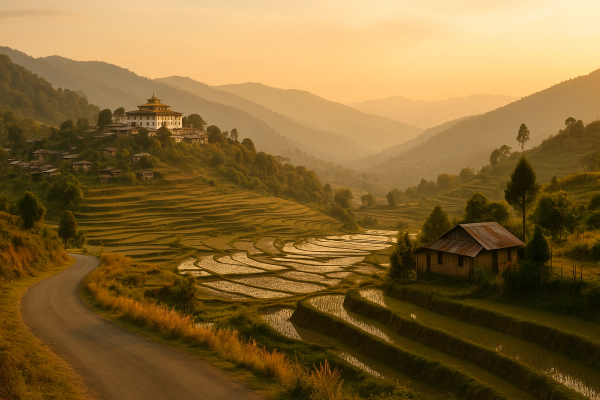The Ultimate Guide to Sustainable Travel for Indian Tourists in 2025#
Ever felt that pang of guilt amidst the joy of exploring a stunning new place? You're marvelling at pristine mountains or turquoise waters, but a little voice whispers about the environmental cost. If you're an Indian traveller increasingly aware of our planet's health, you're not alone. The good news? Travel and responsibility can go hand-in-hand. Welcome to your comprehensive guide to sustainable travel for Indian tourists in 2025 – your roadmap to exploring the world more consciously.¶
As travel rebounds and our wanderlust takes flight again, 2025 presents a unique opportunity to redefine how we explore. This isn't about sacrificing adventure; it's about enriching it. It’s about making choices that protect the beautiful destinations we love and benefit the communities who call them home. This guide dives deep into eco-friendly tips, responsible tourism practices, and destinations championing sustainability, all tailored for the Indian perspective.¶
What Exactly is Sustainable Travel, and Why Should We Care?#
Let's break it down. Sustainable travel, often used interchangeably with responsible or eco-friendly travel, is about visiting a place in a way that respects its environment, culture, and economy. It’s travel that aims to minimise negative impacts and, ideally, leave a place better than we found it.¶
Think of it like being a thoughtful guest in someone's home. You wouldn't waste their resources, disrespect their customs, or ignore their local shops, right? The same principle applies when we travel. For us Indians, with deep-rooted cultural values often emphasizing respect for nature ('Prakriti') and community, embracing responsible tourism practices feels like a natural extension of who we are.¶
Sustainable travel isn't just a trend; it's a necessary shift to ensure future generations (including our own children and grandchildren) can experience the wonders of our diverse world, from the Himalayas to the Kanyakumari coast.
The Three Pillars of Sustainable Tourism:#
- Environmental: Minimising pollution (air, water, plastic), conserving resources (water, energy), protecting biodiversity and natural habitats.
- Social/Cultural: Respecting local traditions and heritage, ensuring tourism benefits local communities fairly, preserving cultural authenticity.
- Economic: Ensuring financial benefits stay within the local community, supporting local businesses and artisans, creating stable income opportunities.
Planning Your Sustainable Trip: The Pre-Travel Checklist for Indian Travellers#
Your journey towards sustainable travel begins long before you pack your bags. Thoughtful planning makes a huge difference.¶
1. Choosing Your Destination Mindfully#
Not all destinations are created equal when it comes to sustainability. Look for places actively working to protect their natural and cultural heritage. Consider off-season travel to reduce pressure on popular spots.¶
- Research destinations known for eco-tourism initiatives (more on specific Indian destinations later!).
- Look for places with national parks, biosphere reserves, or protected areas.
- Consider destinations actively managing tourism impacts (e.g., Bhutan's 'High Value, Low Impact' model).
- Explore closer to home! India offers incredible diversity, reducing the need for long-haul flights.
2. Eco-Friendly Transportation: Getting There Greener#
Transportation is often the biggest chunk of our travel carbon footprint. Making smarter choices here is key for green travel in India and beyond.¶
- Embrace the Rails: India has one of the world's largest rail networks. Trains are significantly more eco-friendly than flights for domestic travel. Plus, they offer a unique cultural experience!
- Fly Smarter: If flying is necessary, choose direct flights (takeoffs and landings burn the most fuel). Fly economy (less space per person = lower emissions per person). Pack light.
- Carbon Offsetting: Consider offsetting your flight's carbon emissions through reputable programs that invest in renewable energy or reforestation projects.
- Local Transport: Once at your destination, opt for public transport (buses, metros), walking, cycling, or shared taxis/rickshaws over private vehicles.
3. Packing Light, Packing Right: The Sustainable Suitcase#
What you pack (and what you don't) matters. Every kilo counts, especially on flights.¶
- The Reusable Revolution: Pack a reusable water bottle (essential in India to avoid buying endless plastic bottles!), a reusable shopping bag, reusable cutlery/straw if needed, and a reusable coffee cup.
- Solid Toiletries: Swap liquid toiletries for solid bars (shampoo, conditioner, soap) to reduce plastic packaging and avoid potential leaks.
- Reef-Safe Sunscreen: If heading to coastal areas, choose sunscreens that don't harm coral reefs.
- Minimal Wardrobe: Pack versatile clothing items you can mix and match. Do you really need five pairs of shoes?
Remember the mantra: Refuse, Reduce, Reuse, Recycle – even while travelling!
4. Researching and Booking Sustainable Accommodations#
Where you stay significantly impacts your travel footprint. Look beyond fancy amenities and seek out places genuinely committed to sustainability. Finding eco-friendly accommodations in India is becoming easier.¶
- Look for certifications like Green Key, LEED, or local eco-labels.
- Read descriptions carefully: Do they mention water conservation, renewable energy, waste management, or supporting local communities?
- Consider homestays or locally-run guesthouses – they often have a lower environmental impact and directly benefit local families.
- Check reviews for comments on sustainability practices.
Being a Responsible Tourist: Your Actions On the Ground#
Sustainable travel isn't just about planning; it's about mindful actions during your trip. These responsible tourism practices make a real difference.¶
1. Respect Local Culture: Be a Gracious Guest#
India itself is a land of immense cultural diversity, so we understand the importance of respecting local customs. Apply this sensitivity wherever you travel.¶
- Dress Appropriately: Be mindful of local dress standards, especially when visiting religious sites.
- Ask Before Clicking: Always ask for permission before taking photos of people.
- Learn Basic Phrases: A simple 'Namaste,' 'Dhanyavad,' or their local equivalents go a long way.
- Be Aware of Local Etiquette: Research basic customs regarding greetings, dining, and interactions.
2. Tread Lightly: Minimise Your Environmental Footprint#
Every small action adds up when it comes to protecting the environment.¶
- Conserve Water & Energy: Turn off lights, AC, and fans when leaving your room. Keep showers short. Reuse towels.
- Say NO to Single-Use Plastic: Refuse plastic bags, straws, and unnecessary packaging. Carry your reusable alternatives.
- Dispose of Waste Properly: Never litter. Use designated bins. If bins aren't available (especially on treks), practice 'Pack In, Pack Out' – carry your trash with you until you find a proper disposal point.
- Stay on Marked Trails: When hiking or exploring natural areas, stick to paths to avoid damaging fragile ecosystems.
3. Support Local, Spend Wisely: Empowering Communities#
One of the most rewarding aspects of sustainable travel for Indian tourists is knowing your spending directly benefits the local people.¶
- Eat Local: Dine at locally-owned restaurants and street food stalls (ensure hygiene!). Savour authentic regional cuisine.
- Shop Local: Buy souvenirs directly from local artisans and craftspeople, not mass-produced trinkets likely made elsewhere. Look for fair trade shops.
- Hire Local Guides: They offer invaluable insights and your money directly supports their livelihood.
- Pay Fair Prices: Avoid aggressive haggling that devalues local labour and crafts.
Your travel spending can be a powerful tool for positive change when directed towards local communities.
4. Mindful Wildlife Encounters: Respect the Locals (Even the Furry Ones!)#
Wildlife tourism can be incredible, but it needs to be done ethically.¶
- Choose Responsible Tour Operators: Select companies with clear ethical guidelines, certified naturalists, and respect for wildlife.
- Maintain Distance: Never crowd, chase, or try to touch wild animals. Use binoculars and zoom lenses.
- Never Feed Wildlife: It disrupts their natural behaviour and can make them dependent or aggressive.
- Avoid Unethical Animal Attractions: Steer clear of elephant rides, tiger petting zoos, or performances involving trained wild animals.
- Don't Buy Wildlife Products: Avoid souvenirs made from endangered species, coral, or shells.
Top Sustainable Travel Destinations for Indian Tourists in 2025#
Ready for some inspiration? India and its neighbours offer fantastic options for sustainable holidays. Here are a few highlights:¶
Destinations Within India:#
1. Kerala: God's Own Green Country#
Known for its backwaters and lush landscapes, Kerala has actively promoted responsible tourism.¶
- Initiatives: Community-based tourism projects, homestays promoted by the government (like Responsible Tourism Mission Kerala), efforts towards plastic reduction, promoting traditional art forms.
- Experiences: Explore Alleppey's backwaters on certified responsible houseboats, stay in spice plantation homestays, visit Periyar Tiger Reserve with trained local guides.
2. Sikkim: India's Organic Haven#
This Himalayan state is India's first fully organic state and a leader in eco-tourism.¶
- Initiatives: Ban on plastic bags and styrofoam, focus on community-based tourism, promoting organic farming, strong waste management policies.
- Experiences: Stay in charming village homestays, trek through pristine forests (like Kanchenjunga National Park), experience unique Buddhist culture respectfully.
3. Ladakh: High Altitude, High Responsibility#
While facing tourism pressures, Ladakh has strong initiatives focused on preserving its unique culture and fragile environment.¶
- Initiatives: Growing network of traditional homestays run by local families, promotion of solar energy, campaigns for waste reduction and responsible trekking.
- Experiences: Opt for homestays over large hotels, use local guides for treks, respect monastery rules, carry reusable water bottles (refill stations are increasing).
4. Coorg (Kodagu), Karnataka: Coffee & Conservation#
The 'Scotland of India' offers lush coffee plantations and a focus on nature-based experiences.¶
- Initiatives: Many estates offer eco-friendly stays, focus on bird watching and nature walks, promoting local Kodava culture.
- Experiences: Stay in eco-lodges or plantation bungalows, enjoy guided nature walks, learn about coffee cultivation, support local spice trade.
5. Spiti Valley, Himachal Pradesh: Remote & Responsible#
This high-altitude desert valley requires mindful travel due to its remoteness and fragile ecosystem.¶
- Initiatives: Strong emphasis on homestays run by local women, projects like 'Ecosphere Spiti' promoting solar energy and sustainable livelihoods.
- Experiences: Choose homestays, hire local drivers/guides, minimise waste (Pack In, Pack Out is crucial), conserve water, respect the ancient monasteries.
Sustainable Gems Near India:#
- Bhutan: Famous for its 'Gross National Happiness' philosophy and strict 'High Value, Low Impact' tourism policy, ensuring sustainability is paramount.
- Nepal: Offers incredible trekking opportunities with a focus on community-based tourism through tea houses and lodges run by locals along popular routes. Support conservation efforts in areas like Chitwan and Sagarmatha National Parks.
Choosing Eco-Friendly Stays: More Than Just a Room#
Let's delve deeper into finding truly sustainable accommodations.¶
What to Look For:#
| Sustainability Feature | What it Means |
|---|---|
| Energy Conservation | Use of solar power, LED lighting, key card energy systems. |
| Water Conservation | Rainwater harvesting, low-flow fixtures, greywater recycling, linen reuse programs. |
| Waste Management | Effective recycling and composting systems, minimizing single-use plastics, sourcing local supplies with less packaging. |
| Local Sourcing | Using local produce in restaurants, sourcing furniture/decor locally. |
| Community Support | Employing local staff, supporting local projects or schools, promoting local culture. |
| Green Building | Using sustainable materials, passive cooling/heating design. |
Types of Eco-Conscious Stays in India:#
- Eco-Lodges: Often built with natural materials, focused on nature immersion and conservation (common near national parks).
- Homestays: Staying with local families offers authentic cultural exchange and direct economic benefit.
- Farm Stays: Experience rural life, learn about agriculture, and enjoy fresh, local food.
- Certified Green Hotels: Larger hotels that have undergone audits and meet specific environmental standards. Finding green hotels in India is becoming more common in cities too.
Finding and Booking:#
- Use booking site filters for 'Sustainable' or 'Eco-friendly' properties (but verify their claims).
- Look for dedicated eco-tourism websites or directories.
- Check the hotel's own website for a sustainability page or policy.
- Don't hesitate to email or call and ask specific questions about their practices.
Overcoming Challenges: Making Sustainable Travel Practical#
Let's be honest, sometimes sustainable choices seem harder. Here's how to navigate common hurdles:¶
Is Sustainable Travel More Expensive?#
Not necessarily! While some high-end eco-lodges can be pricey, many sustainable options are budget-friendly.¶
- Homestays and local guesthouses are often cheaper than hotels.
- Eating at local eateries is usually more affordable (and tastier!).
- Using public transport saves money compared to private taxis.
- Focus on experiences over luxury amenities.
Finding Reliable Information#
It can take a bit more research, but resources are improving.¶
- Look for reputable travel blogs focusing on sustainability.
- Check official tourism websites for responsible travel guidelines.
- Seek out information on certifications and what they actually mean.
Convenience vs. Consciousness#
Sometimes the sustainable option requires a little extra effort (like finding a water refill station). Remember that small, consistent choices make a collective impact. Don't aim for perfection, aim for progress. Every step towards responsible tourism counts.¶
The Future is Green: Our Role in Shaping Travel in 2025 and Beyond#
Sustainable travel for Indian tourists is more than just a checklist; it's a mindset. As travellers, we hold significant power. Our choices signal demand – demand for greener transport, ethical accommodations, and respect for local communities and environments.¶
By embracing these principles in 2025, we not only preserve the destinations we love but also enrich our own travel experiences, connecting more deeply with places and people. We become advocates for a better way to explore our incredible planet.¶
Your Journey to Sustainable Travel Starts Now#
Embarking on sustainable travel might seem daunting initially, but it's essentially about being a more mindful, respectful, and aware traveller. It's about choosing experiences that benefit both you and the destination. From choosing trains over planes within India to carrying a reusable bottle and supporting local artisans, every conscious decision contributes to a more positive impact.¶
Travelling sustainably doesn't mean sacrificing fun or adventure; it means adding layers of purpose and connection to your journeys. So, as you plan your trips for 2025, embrace these eco-friendly travel tips and become part of the movement towards a greener, kinder way of exploring the world.¶
Let's make our travels count – for ourselves, for the planet, and for the vibrant communities that welcome us.
What are your favourite tips for sustainable travel in India? Which eco-friendly destinations are on your 2025 list? Share your thoughts and experiences in the comments below! We'd love to hear from you.¶
For more insights and guides on conscious living and travel, feel free to explore other resources on our site: Learn More on Our Website.¶














